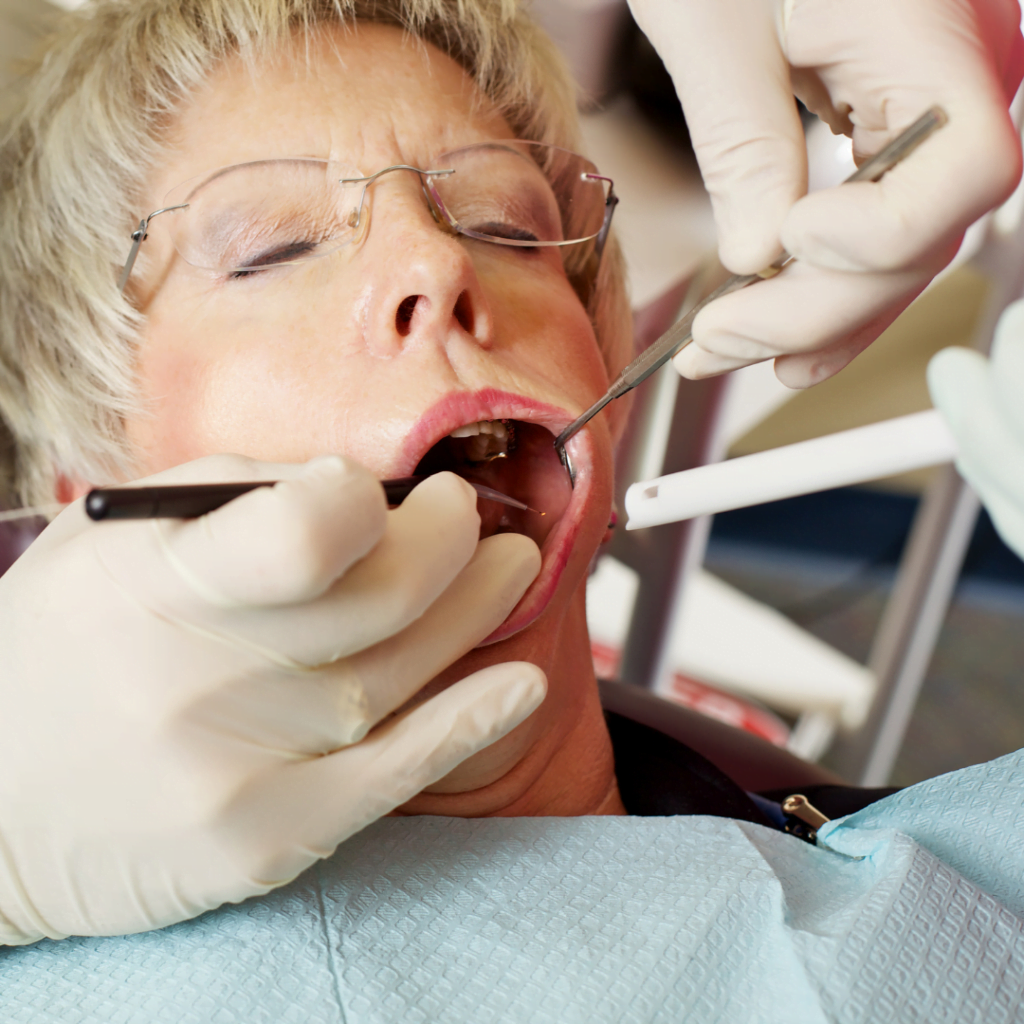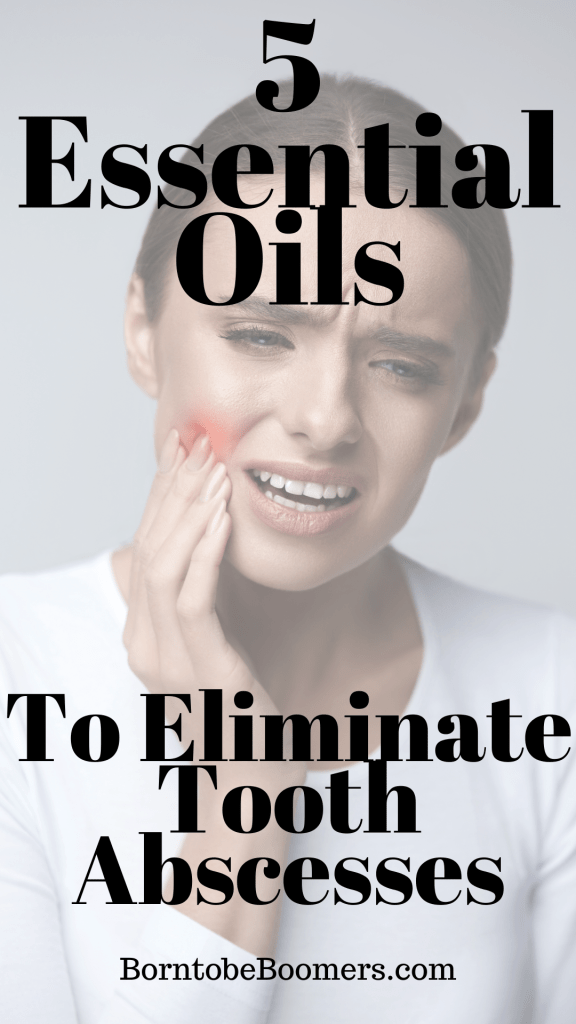Caused by bacterial infections, a dental abscess is the formation of pus that takes place inside your teeth, gums, or in the bone that holds your teeth in place. Getting tooth abscesses can cause a lot of tooth pain.
An abscess that has developed at the end of a tooth is known as a periapical abscess. An abscess in the gums is known as a periodontal abscess. Tooth abscesses occur when unwanted bacteria enter your teeth when they’re chipped, broken, or decaying. The bacteria travel to the center of your decaying or broken tooth and infect it, resulting in pus accumulation in the tooth. The pus slowly swells up and causes the teeth in that area to hurt.
If a tooth abscess isn’t taken care of, it can grow and spread to the gums and even the bone of your mouth. Tooth abscesses are often really painful and will need to be treated by a dentist or dental professional.
However, if you’re looking for a quick fix, certain essential oils can help with toothache pain, provide temporary relief, and offer more benefits for your oral health.
According to a review published in the Journal of the International Society of Preventive & Community Dentistry, essential oils may have the potential to be developed as preventive and therapeutic agents for various oral diseases. In addition, if used carefully, EOs may prove incredibly useful in dental therapy and improve dental treatment quality.
This article will provide all the information about five high-quality essential oils and explain why they’re effective. But, before doing that, let us clear up a few things—symptoms, causes, and treatments for tooth abscesses.
Table of Contents
What are the Symptoms of Tooth Abscess?
If you have recently been feeling pain in your teeth or gums, there may be a chance you have a tooth abscess. Here are the signs and symptoms of a tooth abscess:
- Intense and persistent toothache pain that can be felt back to the jawbone, neck, and even your ear
- Toothache pain that feels worse when you lie down
- Sensitivity to hot and cold temperatures, as well as to the pressure of chewing or biting
- Facial redness and swelling
- Toothache pain when chewing or biting
- Fever
- Swollen, red gums
- Loose or discolored teeth
- Swollen lymph nodes in your neck or under your jaw
- Terrible breath
- Difficulty in breathing or swallowing
- Foul-smelling and foul-tasting
A tooth abscess often causes a pimple-like bump on your gum, and if you press it, the spot will rupture, resulting in instant relief. However, you might feel a sudden bad taste all over your mouth as it was the pus that drained out.
SEE: CORTISOL: THE STRESS HORMONE AND WHAT YOU NEED TO KNOW FOR ADRENAL HEALTH
What causes Tooth Abscess?
No matter how hard your teeth show on the outside, they are filled up with pulp made of nerves, blood vessels, and connective tissues on the inside.
Bacteria can easily invade the inside of your teeth or gums and cause a dental abscess. It can enter through either a cavity or a cracked tooth and spread all the way to your teeth, roots, and gums.
Mainly, there are a few types of tooth abscesses, depending on the way it happens:
- Periapical abscess: This happens when bacteria enter the pulp within your teeth through a cavity.
- Periodontal abscess: Usually, this type of abscess occurs because of any gum disease, but it can also form due to injury.
- Gingival abscess: A foreign substance, including a toothbrush bristle or a popcorn hull, gets stuck in your gums.
The following risk factors below increase the chance of a tooth abscess developing in your teeth or gums:
- Dry mouth: The risk of tooth decay increases a lot when you always have a dry mouth, which may be a side effect of ageing issues or various medications.
- High-sugar diet: Frequent consumption of foods stocked with sugar, like sweets and sodas, contribute to dental cavities. These dental cavities can then expand into a tooth abscess.
- Poor dental hygiene: Ignoring or avoiding proper care of your teeth and gums can increase the risk of tooth decay, gum diseases, tooth abscess, and many other dental complications.
Ensure brushing your teeth twice a day, along with flossing regularly to avoid any mouth issues. The best way to ensure healthy gums and prevent tooth infection is by taking good care of your oral hygiene.

How do you treat a Tooth Abscess?
Although tooth abscesses must be diagnosed and treated by a dental professional, some home remedies can also relieve the toothache pain caused by the serious infection.
Several essential oils have proved to be a good treatment for the pain of an abscessed tooth and can be used as an affordable option to fight bacteria in your teeth and gums.
Here are five pure essential oils that are found effective for managing toothaches:
1. Clove Essential Oil (Syzygium aromaticum)
Clove oil has been used as a natural toothache remedy since ancient times. It is extracted from clove flower buds and is significantly high in eugenol, a strong chemical compound with antibacterial, analgesic (pain relief), and anti-inflammatory properties.
According to a study published in the International Journal of Dentistry, clove oil’s effect on teeth has been found to minimize the rate of tooth decalcification. In case you didn’t know, decalcification is the loss of calcium in teeth that can erode enamel (a protective barrier against acid and bacteria) and lead to tooth decay.
The same study also discovered that clove oil might offer remineralizing effects, which can strengthen your tooth enamel. A strong and strengthened enamel can protect teeth and tooth root canals from discomforting sensations due to cold, sweet, or hot stimuli.
You can find clove essential oil in several grocery stores, and you can also get it here online. Clove EO comes in both diluted forms and highly concentrated clove essential oil form.
If you are using the essential oil form, make sure you dilute it with a carrier oil (a couple of drops of essential oil in an ounce of carrier oil). Dilution is done with carrier oils to help the essential oil get to the affected area quickly.
Ways to use olive oil for tooth abscesses:
- Apply a few drops of the diluted oil to the tooth abscess area using a cotton ball or swab.
- Another way to use it is by turning the clove essential oil into a mouthwash. You can do this by adding a few drops of clove essential oil to a small glass of water.
It is safe to use clove essential oil up to 3 times in a single day.
2. Oregano Essential Oil
Another essential oil that works incredibly well for toothache pain is oregano essential oil. It can be purchased online or at any health food store or drugstore in your locality.
Oregano essential oil is a potent antioxidant and an antibacterial known for its anti-inflammatory properties. In addition, it helps minimize infections in your teeth and gums and can significantly reduce the swelling and toothache pain of tooth abscesses.
In addition to that, oregano oil will boost your immune system, and when combined with coconut oil, can also be used for pulling treatments. Oregano essential oil is one of your best options for oral health treatments, and you must use it if you have an abscessed tooth.
Make sure you dilute the oregano essential oil with a carrier oil to shut out any irritation beforehand.
The proper steps to use oregano oil for tooth abscess:
Step 1. Add an ounce of carrier oil to a few drops of your oregano essential oil.
Step 2. Use a cotton ball or swab and soak a few drops of this mixture.
Step 3. Press the cotton ball or swab on the infected area lightly and hold for around two to three minutes.
Step 4. Take off the cotton ball, and leave the mixture on for around 10 minutes.
Step 5. Rinse thoroughly.
It is safe to use this mixture up to three times in a single day. If the pain continues, you must consult with a dental care professional.
3. Peppermint Essential Oil (Mentha Piperita)
Derived mainly from the flowers and leaves of the peppermint plant, you can use the peppermint essential oil to treat an abscessed tooth. The primary component of the peppermint EO, menthol, is a flavoring and cooling agent and an analgesic used to mask the sensation of toothache pain.
A study conducted by Alvarado LT revealed that menthol produces a cooling sensation by activating a nonselective cation receptor—transient receptor potential melastatin 8.
Moreover, menthol has been shown to form a counter-irritant effect on your skin, which warms the skin after cooling it, significantly reducing the sensation of tooth abscess pain.
How to use peppermint essential oil for tooth abscesses? Soak a peppermint tea bag in a cup of water and apply the wet tea bag directly to the painful area.
Peppermint essential oil is excellent for tooth abscesses if appropriately used. It has also been beneficial for reducing biofilm on teeth, the white and sticky layer of plaque on your teeth. Peppermint is found in several dental products like mouthwash and toothpaste.
4. Tea Tree Essential Oil
Tea Tree is worldwide used as a natural remedy to treat bad breath and as a potent antibacterial agent to kill bacteria in your mouth.
However, this natural remedy is so potent, and you must never use it directly on your teeth and gums. Instead, it is important to dilute tea tree oil with coconut oil before applying it to abscessed teeth and inflamed gums.
In addition to that, remember rinsing and spitting out any residue immediately after the tea tree oil treatment, as it can be very harmful to your insides if swallowed. NOTE that tea tree oil is not made for internal use other than DIY toothpaste or mouthwash.
5. Thyme Essential Oil
Thyme is a part of the mint family, thyme is primarily used in mouthwashes, toothpaste, and elixirs to offer freshness, along with a bit of flavor, for oral treatments. It is a traditional medicine used to help with pain, inflammation, dental care, and fight bacteria.
Thyme contains several natural chemicals that help form a defensive barrier against tooth decay, gingivitis, gum disease, and other general oral infections.
A 2015 study performed on mice supports using thyme oil in traditional medicine for inflammation accompanied by fever. However, there are limited studies on the use of thyme essential oil for humans.
How to use thyme essential oil for tooth abscesses?
- Dilute very few drops of the essential oil in a carrier oil, and then use a cotton ball or your fingers to apply the mixture to the affected area.
- Repeat this a few times a day to get the best results. Additionally, you can even prepare a thyme mouthwash by adding one drop of the essential oil to a glass of lukewarm water.

Prevention of Tooth Abscesses
Tooth abscess happens when you do not take good care of your oral hygiene and dental health. Is it essential to avoid tooth decay to prevent a tooth abscess from developing? Here are some things you can do to prevent tooth abscess:
- Go for dental checkups and teeth cleanings regularly.
- Ensure brushing your teeth two times a day for at least 2 minutes with fluoride toothpaste.
- Use fluoridated water for drinking.
- Keep a personal toothbrush, do not share it with other people, and replace it every three to four months or when its bristles are frayed.
- Floss every single day to cover difficult spots between your gums and teeth.
- Limit consuming foods that contain a lot of sugar. Sweets, chocolates, and sodas lead to cavities, which can further develop into an abscess.
Bottom Line
Using these beneficial essential oils is your most affordable option to prevent tooth abscesses. Integrating a few habits into your life will take good care of your oral health, and you’ll have good dental health forever.
Again, these are home remedies to treat tooth abscesses, and your first option should be visiting the dentist’s office for medical advice and good treatment of this possibly severe infection.
Anyway, if you use these pure essential oils for your toothache pain, let us know how they work out in the comment section below.
Pin it for later!





